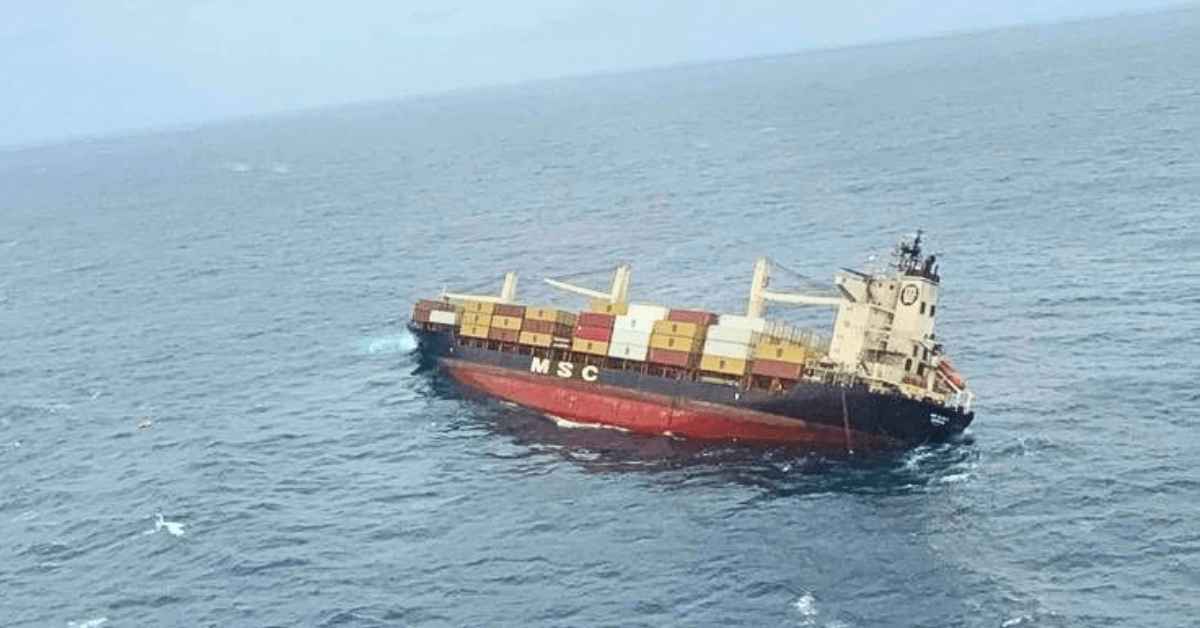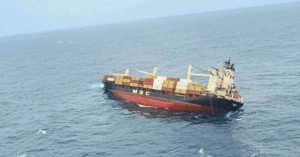
CSSC To Become World’s Largest Shipbuilder After Mega Merger
July 9, 2025
Houthis Kill Four Seafarers In Deadly Red Sea Attack On Bulk Carrier
July 9, 2025

The Kerala government has filed a $1.1 billion (₹9,531 crore) compensation claim against the world’s largest container shipping company, Mediterranean Shipping Company (MSC) after one of its container vessels, MSC ELSA 3, capsized off the state’s coast in May, causing a fuel and chemical spill that led to serious environmental damage.
The case was filed in the High Court of Kerala, which has ordered the conditional arrest of another MSC ship, MSC Akiteta II, currently docked at Vizhinjam Port.
The court said the vessel cannot leave until MSC deposits the claim amount or begins the payment process. However, the ship is allowed to continue cargo loading and unloading operations. A hearing is scheduled for July 10.
The government’s compensation claim includes ₹8,626 crore for environmental destruction caused by the sinking of MSC ELSA 3, ₹378 crore for cleanup and restoration, and ₹527 crore as compensation for fisher-folk who lost their income. The total claim amounts to $1.1 billion.
The state government has also mentioned in its court filing that the incident has impacted local livelihoods and caused a loss of public confidence, which may affect long-term business and tourism in the region.
The Liberian-flagged MSC ELSA 3 was carrying hundreds of tonnes of fuel and 643 containers, some of which contained hazardous cargo. The ship left Vizhinjam Port on May 23 and was en route to Kochi, but it developed a severe tilt after one of its holds flooded and eventually capsized on May 25.
— Indian Coast Guard (@IndiaCoastGuard) May 24, 2025
MSC, the vessel’s operator, informed Indian authorities about the emergency and requested help. The Indian Coast Guard rescued all 24 crew members, 21 were rescued soon after the incident, and the remaining three were later rescued by the Coast Guard.
The incident caused fuel and cargo to leak into the Arabian Sea, which the Kerala government has said led to “massive pollution” of the marine ecosystem. The state’s Environment Department stated in court that oil slicks and floating containers have harmed the coastal environment, fisheries, and public health.
After the spill, the Kerala government advised fishermen to stay away from the sea and distributed cash and food aid to around 1.05 lakh families involved in fishing. Authorities have reported retrieving 61 containers from the total of 643 that were on board when the ship sank.
As of early July, the Directorate General of Shipping said about 450 to 500 tonnes of nurdles (plastic pellets) have been collected from the coast. Clean-up efforts are still ongoing, with volunteers regularly combing the beaches.
According to media reports, six dead marine animals, including a dolphin and a whale, were found, suspected to have died due to exposure to microplastics or toxic substances released from the ship.
The MSC Akiteta II, a 30,592 dwt container vessel with a capacity of 2,226 TEU, was in Vizhinjam Port when the case was filed. Though it is slightly larger than MSC ELSA 3 (which had a 1,730 TEU capacity), the court ruled it could be used as collateral and ordered it detained.
MSC has not yet responded publicly to the case, and no official comment has been reported.

Meanwhile, an investigation into the cause of the accident is ongoing. Indian authorities have reportedly claimed the containers on board MSC ELSA 3 may not have been properly secured or handled.
An interim report was submitted to the Directorate General of Shipping, but officials are still awaiting analysis of the Voyage Data Recorder (VDR), which divers recovered last month.
The captain and crew of MSC ELSA 3 remain in Kochi, facing local police charges related to the alleged mishandling of dangerous cargo and negligence in vessel operation.
The cleanup operation is also facing delays. After completing the initial phase, which involved capping the fuel leaks, MSC decided to switch to a different salvage firm. The new contractor, SMIT, has submitted a new recovery plan to the government.
According to reports, SMIT’s divers and equipment are expected to arrive in India later this month. If weather conditions allow, they plan to start operations in August, with the goal of siphoning remaining fuel from the sunken vessel.
References: Bloomberg, Business Standard
Source: Maritime Shipping News


